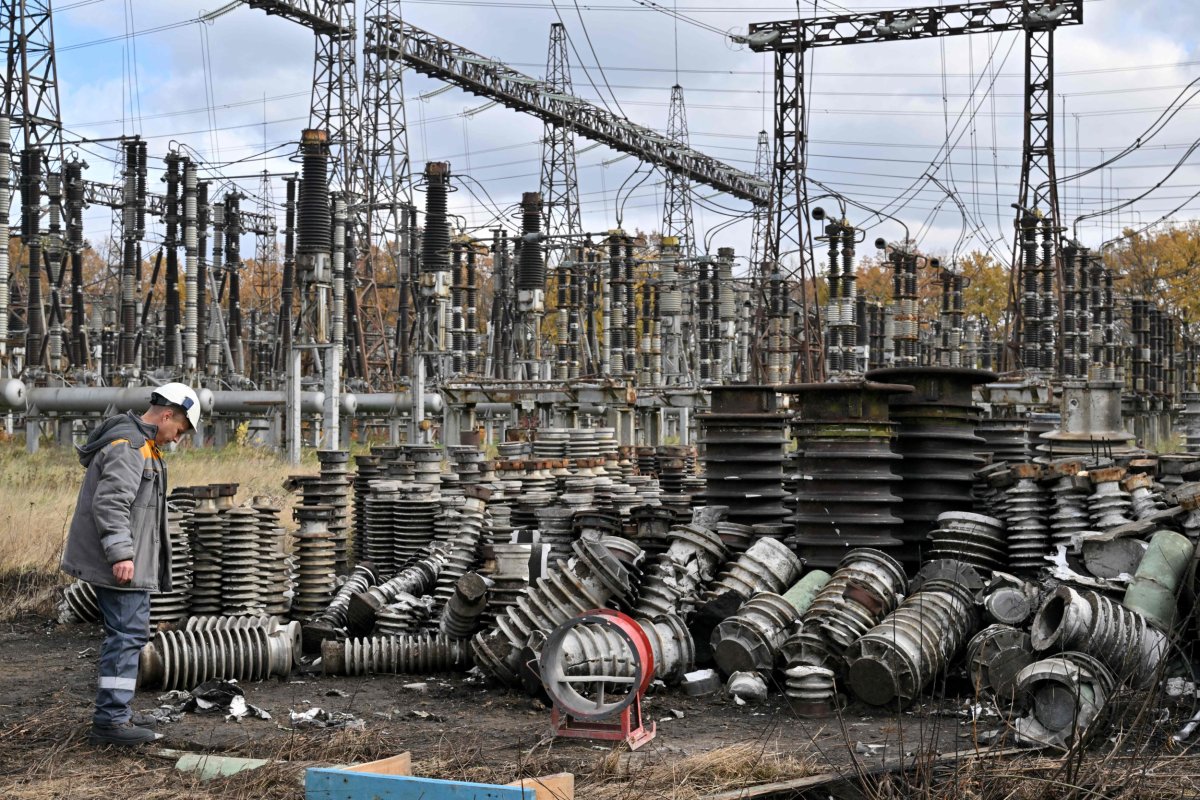DTEK—the Ukrainian energy giant that provides a significant share of the country's energy supply—is running out of equipment to fix the widespread power outages the country has experienced under fire by invading Russian forces.
On Monday, officials with Ukraine's largest privately operated energy company announced it has depleted its stores of equipment following a series of attacks on the country's energy and water infrastructure over the past month. On Monday, Russian forces deployed at least 50 missiles targeting the country's electrical grid and water supplies, leaving swaths of the country without power as winter approaches.
While DTEK Executive Director Dmytro Sakharuk said Monday the company was able to purchase some equipment to offset the losses, the cost of the equipment is "now measured in hundreds of millions of dollars," with some outages estimated to last well into Tuesday.
"DTEK has depleted its stock and we urgently need equipment delivered to us from other countries," DTEK spokesperson Antonina Antosha told Newsweek. "DTEK has requested it multiple times from its international partners and various countries throughout the world. And we have already received some equipment from countries like Germany, Portugal [and] Poland. However, it's not enough."
The attacks come just weeks after Ukrainian officials announced the rollout of regular emergency blackouts across the country as it began repairs on an energy grid that was already susceptible to disruption.

The country only began diversifying its energy holdings in the last decade. And throughout the early days of the war, Russian attacks caused disruptions to the country's nuclear power facilities—which provided the majority of the nation's power—while upending its ability to produce coal, another vital resource, at heavy volumes, forcing a transition to natural gas.
Meanwhile, recent attacks have prompted Ukrainian Energy Minister German Galushchenko to announce the country may need electricity imports to get through the winter.
Before Monday's assault, Russian attacks were estimated to have destroyed approximately 40 percent of the nation's energy infrastructure, Ukrainian officials reported, in what groups like Amnesty International described as an attempt "to undermine industrial production, disrupt transportation, sow fear and despair and deprive civilians in Ukraine of heat, electricity and water as the cold grip of winter approaches."
This winter, according to forecasts, looks to be a relatively mild one. And Ukraine has already begun taking steps to solidify its energy supply entering the winter months.
In recent weeks, residents have been asked to ration power between 7 a.m. and 11 p.m. And while countries like Japan have pledged assistance to help rebuild the country's energy infrastructure, Ukraine has begun looking to import energy from nearby countries like Slovakia, a member of the European Union on Ukraine's border, prompting additional threats from the Kremlin.
"The road to the stability of energy supply is different," Dmitry Medvedev, the deputy head of Russia's Security Council, said in a post on his Telegram channel last week. "It requires recognizing the legitimacy of Russia's demands within the framework of the special military operation and its results, reflected in our Constitution. Then the power supply situation will get better."
DTEK, meanwhile, has called on additional aid to meet its needs before the winter months.
"We are very hopeful that this process will speed up within the upcoming days," said Antosha. "Attacks by the Russian military forces on the objects of Ukraine's energy infrastructure are ongoing, and it's practically impossible to predict when and where the next attack will take place. With the winter season approaching, it is critical to have the energy system properly functioning so that millions of Ukrainians have lights on and heat in their houses throughout one of the hardest winters in the history of Ukraine's independence."
Update 11/1/2022 9:05 a.m. ET: This story has been updated with comments from DTEK spokesperson.
Uncommon Knowledge
Newsweek is committed to challenging conventional wisdom and finding connections in the search for common ground.
Newsweek is committed to challenging conventional wisdom and finding connections in the search for common ground.
About the writer
Nick Reynolds is a senior politics reporter at Newsweek. A native of Central New York, he previously worked as a ... Read more
To read how Newsweek uses AI as a newsroom tool, Click here.








